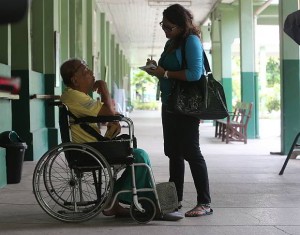Business leader says set up facilities, manpower first

Cebu needs its hospitality to be backed with a livable environment and world class competency for it to have a chance at the global geriatric care market. (CDN FILE)
Cebu needs to put in place several things like world-class facilities, world class trained medical workers and even a clean environment before we can cater to the elderly care market.
Gordon Alan Joseph gave this advice as an answer to a recent call from Retirement and Healthcare Coalition (RHC) executive director Marc Daubenbeuchel for the country to tap the growing global geriatric market.
Daubenbeuchel said in an Inquirer report that the Philippines is primed to become one of the leading destinations in the world for nursing care, but the government must step up efforts and investments to build up capacities in the local medical field.
Cebu Business Club president Gordon Alan Joseph agreed pointing out that there are critical things that needed to be put in place first.
“Yes we can, and we probably should be given the demand because of the availability of caregivers and nurses here. However, we need medical workers that are trained in world class standards of health care. We also need a strict accreditation process to ensure high standards of quality. We will need world class medical facilities which is what these retirees will constantly require,” said Joseph.
He said we will also need a clean environment where there are no polluted water, air and noise.
“We will also need language proficiency for the target markets which is not a simple process,” he said.
“Preparation and planning are needed and we do need to create a welcoming, and competent environment. It isn’t just about how wonderful our smiles are or about how hospitable we are. This all must be backed up by a livable environment and world class competency,” he said.
Joseph added that there is also a need to amend tedious immigration requirements for retirees.
“Our bureaucracy is totally unfriendly and not welcoming.”
Jeruel Roa, president of Mandaue Chamber of Commerce and Industry, said he thinks Cebu or the Philippines for that matter have more than enough manpower and expertise including nurses, caregivers, doctors and medical-related professionals to handle professional geriatric care especially for the foreign market which will come here for that service.
“Current or prospective private investors in the health care industry would likely be willing to set up facilities in which to deliver this kind of service if the size of the market that is willing to pay for it is established or assured,” Roa said.
“The question is, in foresight, even if this succeeds, what do we do with the local geriatrics who need care but most of whom cannot afford these services?” Roa asked.
Ma. Teresa Chan, president of Cebu Chamber of Commerce and Industry, said that Cebu has the capacity to handle the geriatric care market.
“Great potential of course. One, we have a young population, one of the youngest in the world. I can’t imagine other countries with old population taking care of the old. Two, we have the necessary facilities — natural and manmade like for entertainment, shopping, mental and physical exercise for them to still maintain the quality of life they used to enjoy, and maybe even better, at lower cost, and we have good medical facilities and competent doctors, all these are accessible within minutes,” said Chan.
Daubenbeuchel said the Philippines already has a built-in advantage with its location, weather and the Filipinos’ fluency in English, which most of the other countries offering the same service does not possess.
At present, however, the country lags behind its neighbors in attracting foreign retirees to settle at nursing facilities, which Thailand is dominating in the Asian region.
He said this is because the nursing care industry is well supported by the Thai government with investments in medical facilities that support the industry.
Related Stories:
Japanese firm unveils SRP retirees haven plan
Retirement facility at SRP pushed
Disclaimer: The comments uploaded on this site do not necessarily represent or reflect the views of management and owner of Cebudailynews. We reserve the right to exclude comments that we deem to be inconsistent with our editorial standards.
